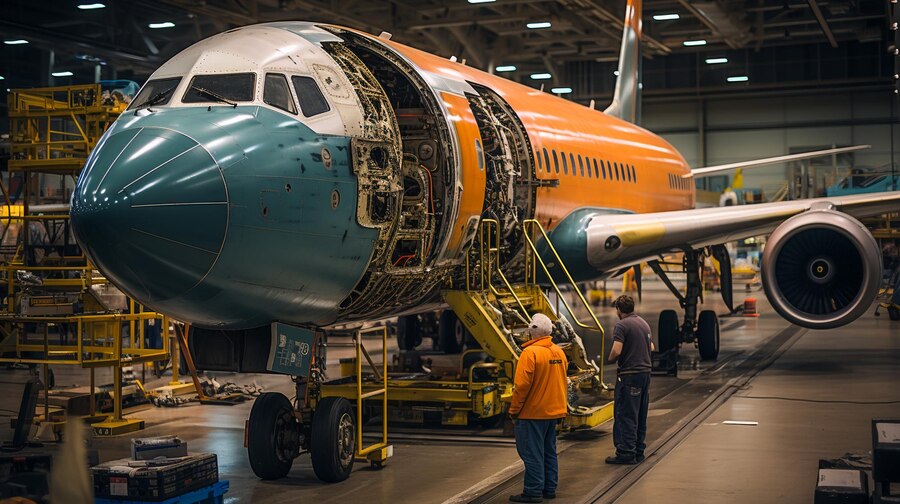I. Introduction
A. Overview of AS9100 certification and its importance in aerospace and defense industries.
AS9100 certification stands as a cornerstone of quality assurance in the aerospace and defense sectors, ensuring that organizations meet rigorous standards to deliver safe and reliable products and services. Developed by the International Aerospace Quality Group (IAQG), AS9100 is based on ISO 9001 but includes additional requirements specific to the aerospace industry.
Importance of AS9100 Certification:
- Ensuring Safety and Reliability: In aerospace and defense, precision and reliability are paramount. AS9100 certification ensures that organizations adhere to strict quality management practices throughout their processes, from design and production to maintenance and customer service. This commitment to quality helps mitigate risks and ensures the safety of personnel and equipment.
- Meeting Regulatory Requirements: Aerospace and defense industries are heavily regulated due to the critical nature of their products. AS9100 certification demonstrates compliance with regulatory bodies and industry standards, which is essential for gaining approvals, licenses, and contracts.
- Enhancing Customer Confidence: Customers in the aerospace and defense sectors demand the highest levels of quality and reliability. AS9100 certification serves as a tangible proof that an organization has implemented robust quality management systems, thereby instilling confidence among customers and stakeholders.
II. Understanding AS9100 Certification
A. Definition and purpose of AS9100 certification
AS9100 certification is a specialized quality management system standard for the aerospace industry, based on ISO 9001 but with additional aerospace-specific requirements. Its primary purpose is to ensure the consistent production of safe, reliable, and high-quality aerospace products and services.
B. Key benefits for organizations seeking certification
- Enhanced Quality Assurance: AS9100 helps organizations implement stringent quality controls throughout operations, minimizing defects and improving product reliability.
- Improved Customer Satisfaction: Certification demonstrates commitment to meeting customer requirements consistently, enhancing satisfaction and strengthening client relationships.
- Global Recognition and Market Access: Recognized internationally, AS9100 facilitates entry into global aerospace supply chains and markets.
- Operational Efficiency: Standardizing processes and optimizing resources lead to cost savings and increased productivity.
- Compliance with Regulatory Requirements: Ensures adherence to stringent aerospace regulatory standards.
III. Requirements and Criteria
A. Detailed explanation of AS9100 requirements
AS9100 sets forth comprehensive requirements that aerospace organizations must adhere to in order to achieve certification. These include establishing and maintaining a robust Quality Management System (QMS), managing risks throughout the product lifecycle, ensuring configuration management, controlling documents, managing suppliers, and driving continuous improvement.
B. Criteria organizations must meet for certification
Organizations seeking AS9100 certification must demonstrate compliance with specific criteria that validate their adherence to the standard’s requirements. This includes active leadership involvement, effective implementation of QMS procedures, providing adequate training, establishing performance metrics, ensuring legal and regulatory compliance, and fostering a culture of continuous improvement.

IV. Steps to Achieving AS9100 Certification
A. Preparation phase: assessing readiness and identifying gaps
Before pursuing AS9100 certification, organizations must assess their current processes and systems to identify gaps and areas needing improvement. This phase involves evaluating existing practices against AS9100 requirements, conducting a gap analysis, and determining necessary resources and timelines for certification preparation.
B. Implementation phase: making necessary changes and improvements
During this phase, organizations implement changes and improvements identified in the preparation phase to align with AS9100 requirements. Key activities include revising procedures, training personnel on new processes, updating documentation, and integrating quality management practices across all departments. Implementation ensures that the QMS is effectively deployed and operationalized throughout the organization.
V. Challenges and Common Pitfalls
A. Common challenges in achieving AS9100 certification
Achieving AS9100 certification presents several common challenges for aerospace organizations, including:
- Complexity of Requirements: AS9100 standards are highly detailed and specific, requiring meticulous alignment of processes and documentation.
- Resource Allocation: Securing adequate resources, both financial and personnel, to support the certification process can be challenging.
- Cultural Change: Implementing a quality management system that involves cultural shifts and changes in organizational mindset can encounter resistance.
- Documentation Management: Managing extensive documentation requirements and ensuring compliance with document control standards can be overwhelming.
B. Strategies for overcoming challenges
To overcome these challenges and achieve successful AS9100 certification, organizations can implement the following strategies:
- Top Management Commitment: Secure commitment from senior leadership to prioritize and support the certification process, ensuring adequate resources and fostering a culture of quality.
- Detailed Planning and Preparation: Conduct thorough planning, including a gap analysis, to identify areas needing improvement and establish a clear roadmap for certification.
- Training and Awareness: Provide comprehensive training to employees on AS9100 requirements, their roles within the QMS, and the importance of compliance.
- Continuous Improvement: Implement a continuous improvement cycle to address identified gaps, optimize processes, and enhance overall QMS effectiveness.
VI. Benefits of AS9100 Certification
A. Advantages of achieving AS9100 certification
Achieving AS9100 certification offers several advantages to aerospace organizations:
- Enhanced Quality Assurance: Certification ensures adherence to rigorous quality management standards, resulting in improved product reliability and customer satisfaction.
- Compliance and Market Access: Certification demonstrates compliance with industry-specific regulatory requirements, facilitating market access and enhancing credibility with customers and stakeholders.
- Risk Mitigation: Implementation of AS9100 standards helps mitigate risks associated with product defects, safety concerns, and regulatory non-compliance.
- Continuous Improvement: Certification promotes a culture of continuous improvement, driving efficiency gains and operational excellence across organizational processes.
B. Competitive benefits in aerospace and defense sectors
AS9100 certification provides significant competitive advantages in the aerospace and defense industries:
- Market Differentiation: Certified organizations stand out in competitive bidding processes and procurement opportunities, distinguishing themselves as reliable and trusted suppliers.
- Global Recognition: Certification is recognized internationally, enabling access to global markets and enhancing opportunities for collaboration with multinational aerospace corporations.
- Supplier Requirements: Many prime contractors and OEMs require their suppliers to be AS9100 certified, making certification a prerequisite for securing lucrative contracts and partnerships.
VII. Maintaining AS9100 Certification
A. Importance of ongoing compliance and continuous improvement
Maintaining AS9100 certification requires ongoing compliance with the standard’s requirements and a commitment to continuous improvement. This ensures that aerospace organizations consistently meet quality management expectations, adhere to regulatory requirements, and enhance operational efficiency. Continuous improvement fosters innovation, identifies areas for optimization, and reinforces a culture of quality throughout the organization.
B. Requirements for maintaining AS9100 certification
To maintain AS9100 certification, organizations must:
- Conduct Internal Audits: Regularly perform internal audits to assess the effectiveness of the Quality Management System (QMS), identify non-conformities, and implement corrective actions.
- Management Review: Conduct periodic management reviews to evaluate the QMS’s performance, review audit results, and make strategic decisions for improvement.
- Document Control: Maintain accurate and up-to-date documentation of processes, procedures, and records required by AS9100 standards.
- Training and Competence: Ensure ongoing training and development of personnel to maintain competence in performing their roles within the QMS.
- Risk Management: Continuously monitor and manage risks to product quality, safety, and regulatory compliance throughout the product lifecycle.
VIII. Conclusion
A. Recap of key points discussed in the blog
Throughout this blog, we’ve explored AS9100 and its profound implications for the aerospace and defense industries. We began by outlining the specific requirements and criteria essential for achieving AS9100, emphasizing its role in ensuring the highest standards of quality, safety, and reliability in aerospace products and services. We discussed the comprehensive benefits of certification, including enhanced market access, improved operational efficiency, and increased customer confidence.
B. Final thoughts on the significance of AS9100
AS9100 is not merely a badge of compliance but a strategic tool that empowers aerospace organizations to excel in a competitive global market. It signifies a commitment to continuous improvement, regulatory compliance, and customer satisfaction. By achieving AS9100 certification, organizations demonstrate their capability to consistently meet industry standards, mitigate risks, and enhance organizational resilience and reputation.
C. Call to action for organizations interested in pursuing AS9100 certification
For organizations aspiring to strengthen their position in the aerospace industry, pursuing AS9100 is a decisive step towards achieving operational excellence and market competitiveness. Embrace the opportunity to enhance your quality management systems, differentiate your offerings, and expand your market reach globally. Invest in the future success of your organization by pursuing AS9100 certification and establishing yourself as a trusted leader in aerospace quality and reliability.
